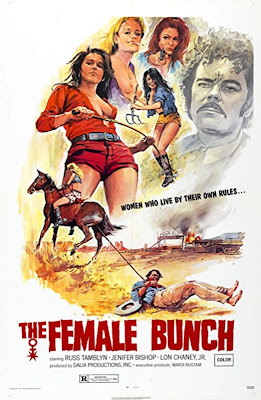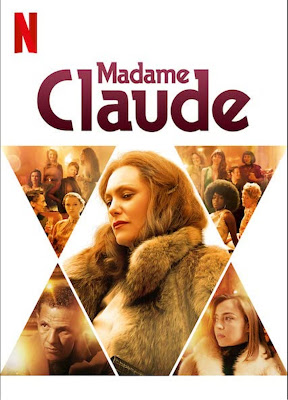Before the
Mayflower Madam, and well before the
Hollywood Madam, there was
Madame Claude, who in her 1960s and
’70s heyday reportedly supplied women for John F. Kennedy and the Shah of Iran. All three women got their stories told in made-for-TV movies, but only Madame Claude (real name Fernande Grudet) merited a feature.
Unfortunately for Grudet, that theatrical film, 1977’s Madame Claude, was directed by Just Jaeckin, the same man who gave the world Emmanuelle. While Jaeckin does provide some biographical details about the Parisienne madam (excellently portrayed by
Françoise Fabian), such as her acting as a police informant in exchange for police protection, he primarily uses her as a framing device for setting up a series of softcore sex scenes. The movie seems more focused on the character David Evans (Murray Head, post-Sunday Bloody Sunday and pre-“One Night in Bangkok”), a sleazy photographer being used by police to get incriminating snapshots of Mme. Claude’s girls with their clients. Another story thread focuses on Elizabeth (a better-than-usual Dayle Haddon), the madam’s newest recruit who is alternately too headstrong to tolerate the controlling madam’s bullshit, yet too naïve to realize she’ll never be more than a whore to her clients. The movie also features Robert Webber as a JFK stand-in and Klaus Kinski as a hedonistic business tycoon (don’t worry, neither of them get naked).
As one might expect from fashion photographer-turned-erotic filmmaker Jaeckin, Madame Claude looks great and it has a few spirited sex scenes, but the movie’s tone is all over the place, bouncing from frothy sex romp to sexy drama to political thriller. The movie is further hampered by its disjointed narrative, which is often hard to follow. Only Fabian’s performance as the steely Claude gives the movie any real dramatic weight. Jaeckin may have been going for something a little more substantial than his previous softcore outings, but ultimately the movie is less Klute with a French accent and more akin to The Happy Hooker Goes to Washington remade as a French drama.
Madame Claude did spawn a 1981sequel, Madame Claude 2, directed by François Mimet, though its a.k.a., Intimate Moments, is more fitting as it has even less to do with the infamous madam than the first movie. It’s pure Skinemax trash. No, Mme. Grudet didn’t get a proper biopic until Sylvie Verheyde’s Madame Claude landed on Netflix last year.
Verheyde’s film is more serious—
way more—than exploitative, and its story is structured more like a traditional biopic, making it easier to follow than Jaeckin’s film, though viewers still need to be fast on their feet to keep up with some of the political machinations. The titular madame is played by Karole Rocher, and while her acting is fine, I thought her portrayal reduced Mme. Claude to little more than a neurotic bitch—you know, the kind you see in almost every other French melodrama. (I don’t know if this portrayal is more accurate, but it's certainly less interesting.) Fabian’s performance showed a woman who was always in control, while Rocher’s madam is frequently throwing tantrums and breaking shit like she’s on
The Real Housewives of Marais. She’s also colder than any street pimp. After one of her girls returns from a date all bruised and bloody, the madam blithely tells her, “It’s nothing. A nice shower, a good night’s sleep, and that’s the end of it.”
Unlike Jaeckin’s film, which never looks like it’s taking place in a time other than the mid-’70s, Verheyde’s Madame Claude pays more attention to period detail. Still, there are anachronisms, primarily with the character Sidonie (Garrance Marillier), who is sort of this movie’s Elizabeth, if Elizabeth was a wealthy girl with daddy issues. Sidonie is always smoking 120s, even in the scenes set in the late 1960s, when that length of cigarette wasn’t introduced until the early ’70s. Worse, Sidonie’s look never, ever changes. Whether it’s the 1960s or 1990s, Sidonie always looks like a 20-something woman with the exact same hairstyle. This oversight is pretty fucking glaring considering that the movie takes great pains to make sure 1990s-era Mme. Claude looks like she’s in her 70s. The movie also can’t escape its cheapness, with much of it being shot on cramped sets, giving it an overall claustrophobic feel. Madame Claude 2021 may be leagues above Call Me: The Rise and Fall of Heidi Fleiss, but it’s still a made-for-TV movie.
For all its flaws, I think Verheyde’s movie is the better biopic, which is why I’m giving it a half-star more. However, I think Jaeckin’s brand of highbrow Eurotrash is the more interesting watch.








